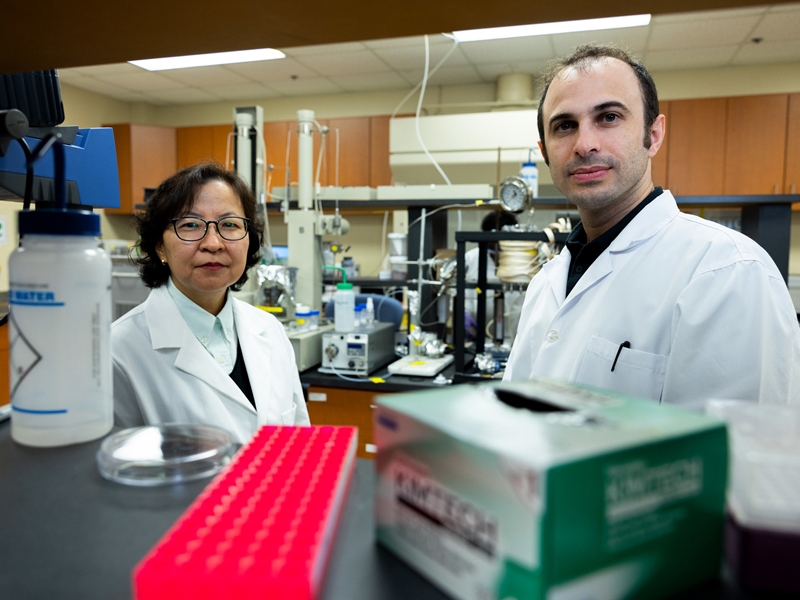Probiotics Research Looks to 3D Printing to Get the Good Stuff in the Gut

Sun-Ok Lee, left, associate professor of nutrition, and Ali Ubeyitogullari, assistant professor of food engineering, are working to improve probiotics with 3D food printing technology.
Nutrition and food science researchers at the Arkansas Agricultural Experiment Station are working to improve the impact probiotics can have on gut health using 3D food printers.
Probiotics, living microorganisms like those found in some yogurts, are helpful for gut health. However, because of environmental conditions, the active microorganisms in probiotics like Lactobacillus and Bifidobacterium don't always make it to the gastrointestinal tract, said Sun-Ok Lee, associate professor of nutrition with the food science department.
Lee is giving 3D printing a shot at improving the survival of probiotics with support from a nearly $300,000 grant from the U.S. Department of Agriculture's National Institute of Food and Agriculture. Improved delivery methods for probiotics could benefit animal and human health with further testing, said Lee, who conducts research for the experiment station, the research arm of the U of A System Division of Agriculture.
"There is a critical need for an innovative encapsulation technique that will promote probiotics' stability during food processing while enabling effective delivery to the colon," Lee said. In other words, Lee is seeking a way to protect the probiotics through the food processing, transportation and storage phases, and then survive the stomach acids once consumed.
"Gut health is connected to heart and brain health and the immune system. So, it is important in the prevention of chronic diseases," she said.
Lee is working with Ali Ubeyitogullari, assistant professor of food engineering in the Food Science and Biological and Agricultural Engineering departments. They are using his 3D food printing technology to protect the probiotics in alginate-pectin microgel beads. The alginate is made from seaweed extract, and pectin is a polysaccharide, a chain of simple sugar molecules, obtained from fruits such as apples. The goal is to encase the probiotics in a pH-sensitive material that is resistant to low pH, highly acidic conditions, like the stomach, but will open in less acidic levels found in the colon.
Their study includes infusing the probiotic microgel beads into yogurt and cookies to evaluate their viability during processing, storage and digestion.
"During almost all the processing steps, the probiotics are exposed to external pressures like temperature, so we are trying to make them stable during food processing. With 3D printing, we can precisely locate and encapsulate them at the same time," Ubeyitogullari said. "And this can be infused directly into the product, where you deal with the right amount and position."
Ubeyitogullari said the objective is for the 3D printer to deliver streams of encapsulated probiotic microgel beads with high precision and flexibility. These beads would be printed using "ink" made from probiotics that are precisely mixed with a gel-like starchy material made from corn. The microbeads are then freeze-dried and coated with a layer of soluble lipids that allows the probiotics to be released at the right time and location — the colon — with the pH-sensitive alginate-pectin.
Lee noted they measure probiotics by cell counts — millions of cells per gram of food. Incorporating probiotics into microgel beads allows them to be weighed more precisely when making probiotic-filled foods.
To learn more about Division of Agriculture research, visit the Arkansas Agricultural Experiment Station website: https://aaes.uada.edu. Follow on Twitter at @ArkAgResearch. To learn more about the Division of Agriculture, visit https://uada.edu/. Follow us on Twitter at @AgInArk. To learn about extension programs in Arkansas, contact your local Cooperative Extension Service agent or visit www.uaex.uada.edu.
About the Division of Agriculture: The University of Arkansas System Division of Agriculture's mission is to strengthen agriculture, communities, and families by connecting trusted research to the adoption of best practices. Through the Agricultural Experiment Station and the Cooperative Extension Service, the Division of Agriculture conducts research and extension work within the nation's historic land grant education system.
The Division of Agriculture is one of 20 entities within the University of Arkansas System. It has offices in all 75 counties in Arkansas and faculty on five system campuses.
The University of Arkansas System Division of Agriculture offers all its Extension and Research programs and services without regard to race, color, sex, gender identity, sexual orientation, national origin, religion, age, disability, marital or veteran status, genetic information, or any other legally protected status, and is an Affirmative Action/Equal Opportunity Employer.
Topics
Contacts
John Lovett, project/program specialist
Agricultural Communication Services
479-763-5929,
jl119@uark.edu
Headlines
Four Students Named Goldwater Scholars; Two Earn Udall Honorable Mentions
Four U of A students have received the prestigious Goldwater Scholarship, an award for top students in mathematics, science, and engineering.
Cross-Campus Collaboration Culminates in New Outdoor Geological Installation
Grand opening event to celebrate the new GeoLab installation at the U of A’s Gearhart Hall courtyard is set for May 3. The installation will be open to the public year-round.
First Students to Use Online Degree to Hone Nursing Leadership, Elevate Patient Care
Hanna Baxendale and Wendi Kimbrell will begin coursework in the Doctor of Nursing Practice-Executive Master of Business Administration program offered by the Eleanor Mann School of Nursing and Walton College.
Join the Office for Sustainability on a Final Cruise to Campus
Cruise to Campus Wednesdays have fostered a gathering space for individuals interested in biking to campus. Drop by the Old Main Lawn from 7:30-10 a.m. Wednesday for coffee, something to eat and conversation.
Fay Jones School Student Ambassador Program Gives Voice to Design Students
The student ambassador program at the Fay Jones School of Architecture and Design is built to connect top design students with their school, its alumni, its future students and others inside and outside the school.




